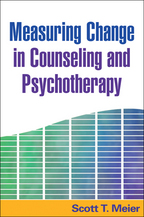Measuring Change in Counseling and Psychotherapy
Scott T. Meier
“This text should have a prominent place in professional psychology training programs. It offers an important and needed perspective on measurement for those preparing for careers in counseling and psychotherapy, and a helpful corrective to the practice of relying on trait measures for the evaluation of clinical change. Meier has done a fine job of tying measurement to practice issues, showing how outcome data can be used for clinical feedback and to inform clinical decision making. He clearly distinguishes how a test that is valid for measuring traits may not be valid for measuring clinical change, and vice versa. At a time when accountability is a driving force in the profession, the measurement and assessment perspectives provided by this book couldn’t be more opportune. This book would be most pertinent to doctoral and master's students in counseling psychology and would make an excellent addition to an assessment sequence—in particular, as a companion text in a personality/psychodiagnostic assessment course.”
—James W. Lichtenberg, PhD, Professor of Counseling Psychology and Associate Dean, School of Education, University of Kansas
“The strength of this book is that it offers comprehensive and sophisticated coverage of issues related to psychological testing, with a special focus on issues related to counseling and psychotherapy, which makes it unique and valuable. The author does a very good job of explaining terms and concepts and takes the reader deep into the complex and sophisticated world of psychological testing. I would highly recommend it to colleagues interested in psychotherapy research and empirical evaluations of psychotherapy services.”
—John Suler, PhD, Department of Psychology, Rider University
“A cutting-edge text that highlights the theoretical, methodological, and practical differences between traditional psychological measurement and the measurement of change in counseling/psychotherapy. It is very timely given the current pressures for accountability.”
—David A. Vermeersch, PhD, Department of Psychology, Loma Linda University
“The approach makes a great deal of sense. It covers important conceptual issues as well as practical matters. When students complete the assignments they will be prepared to go through the same steps in either selecting an outcome measure or in organizing an assessment strategy as well as critically appraising existing practices and their limitations. I would recommend the book to a colleague who wants students to have a good primer for assessing treatment effects.”
—Michael J. Lambert, PhD, Department of Psychology, Brigham Young University
Table of Contents
1. Introduction and RationaleContemporary Psychological Testing
Contemporary Psychotherapy Research and Practice
The Implications of Research Stuckness for Clinical Practice
Summary and Conclusions
2. A History of Traits
The Seeds of Conflict
The Desire to Be Scientific
The Model of Physiology
Biology and Individual Differences
The Desire to Be Relevant
The Need for Classification
The Consequences of the Adoption of a Trait-Based Measurement Paradigm
Loss of Experimental Methods Inhibits Recognition of Method Variance
The Gain of Traits and Loss of Situations
Handling Error with Classical Test Theory
Statistics Related to Measurement
Assessment as a Complement to Measurement
Deemphasizing Measurement Theory
Loss of Precision
The Wisdom and Tyranny of Tradition
The Success and Failure of the Market
Summary and Implications
3. Reliability, Validity, and Systematic Errors
Introduction
Thinking about Reliability and Validity
Types of Validity
Constructs, Theories, and Valid Measurement
Construct Explication
Multitrait–Multimethod Matrices: Investigating the Effects of Method Variance on Validity
Campbell and Fiske
Criteria for Construct Validity
An MTMM Example
Problems with Campbell and Fiske's approach
The Factor Analytic Approach to Construct Validity
History of Self-Report and Interview Errors
Self-Reports
Interviews and Observational Methods
Measurement Error
Systematic Errors Associated with Self-Reports
Dissimulation and Malingering
Social Desirability
Systematic Errors Associated with Ratings by Others
Halo Errors
Leniency and Criticalness Errors
Causes of Inconsistency
Cognitive Influences
Item Comprehension Problems
Test Cues
Low Cognitive Ability
Affective and Motivational Influences
Test Anxiety
Negative Emotional States
Environmental and Cultural Influences
Reactivity
Stereotype Threat
Summary and Implications
4. States, Traits, and Validity
Introduction
History
The Controversy of Mischel and Peterson: The Benefits of Conflict
The Rejection of Traits: Behavioral Assessment
Reinforcing the Trait Argument
Person–environment Interactions
Aptitude-by-Treatment Interactions
Environmental Assessment
Moderators of Cross-Situational Consistency
Summary and Integration
5. Context Effects and Validity
Introduction
Understanding Inconsistency: Clues from Psychophysics Measurement
The Limitations of Psychophysical Measurement
Conclusions and Implications from Psychophysical Research
Improving the Principles of Construct Explication
Test Purpose
Test Content
Test Context
Shared Contexts and Method Variance
Applications
Recommendations Related to Test Purpose
Recommendations Related to Test Content
Recommendations Related to Test Contexts
Summary and Implications
6. Nomothetic Approaches to Measuring Change and Influencing Outcomes
History and Background
Examples of Nomothetic Measures
Beck Depression Inventory
State–Trait Anxiety Inventory
Global Assessment of Functioning
Outcome Questionnaire
Psychometric Principles and Nomothetic Measures
Reliability of Nomothetic Measures
Validity
Applications
Creating Change-Sensitive Measures
Psychometric Properties of Aggregate Scales
Using Change-Sensitive Tests in Program Evaluations
An Evidence-Based Approach to Supervision
Summary and Integration
7. Idiographic Approaches to Measuring Change and Influencing Outcomes
History and Background
Psychometric Principles and Idiographic Measures
Reliability of Idiographic Measures
Validity of Idiographic Measures
Applications
Begin with the Case Conceptualization
